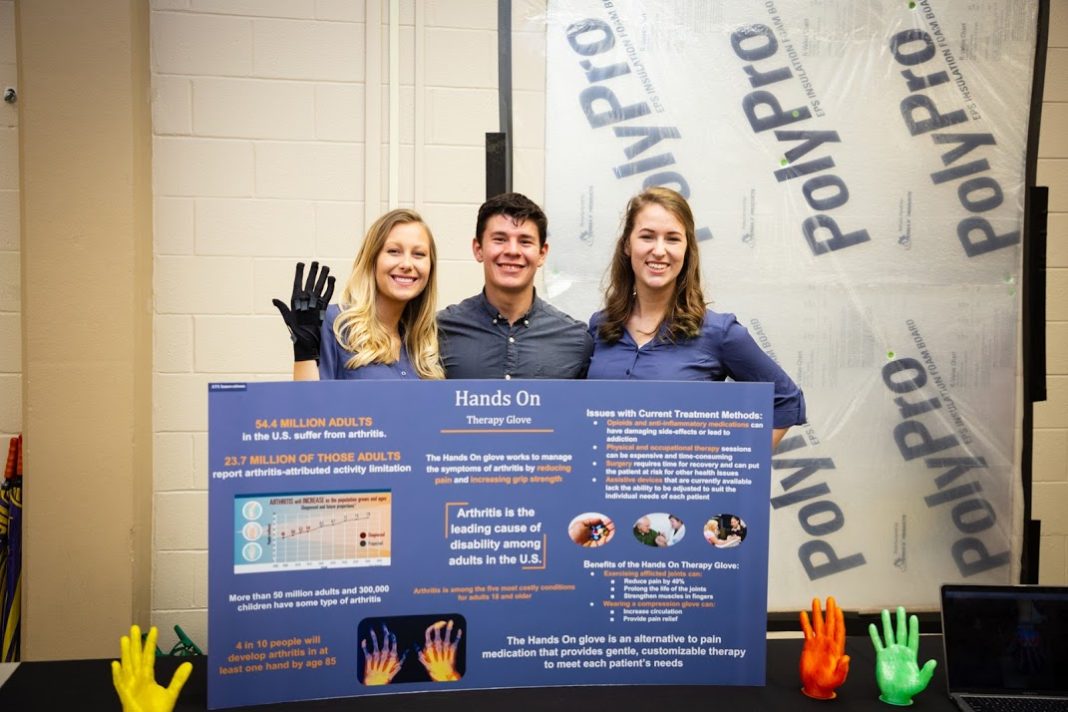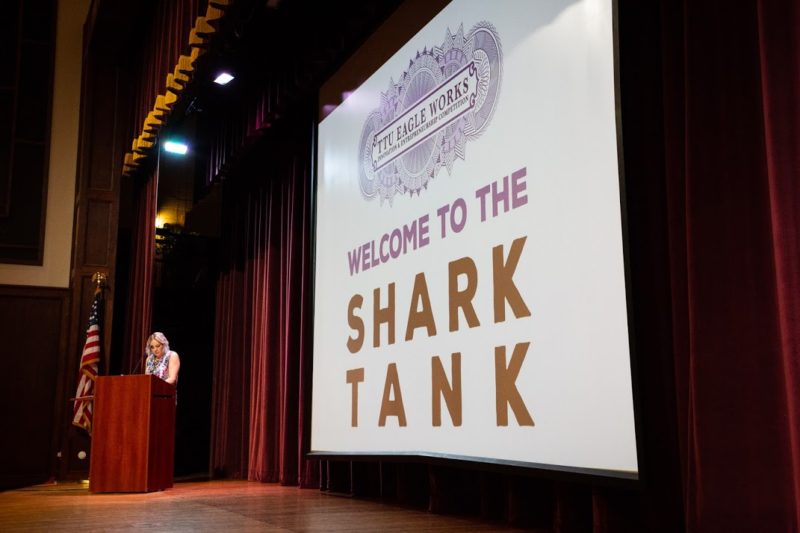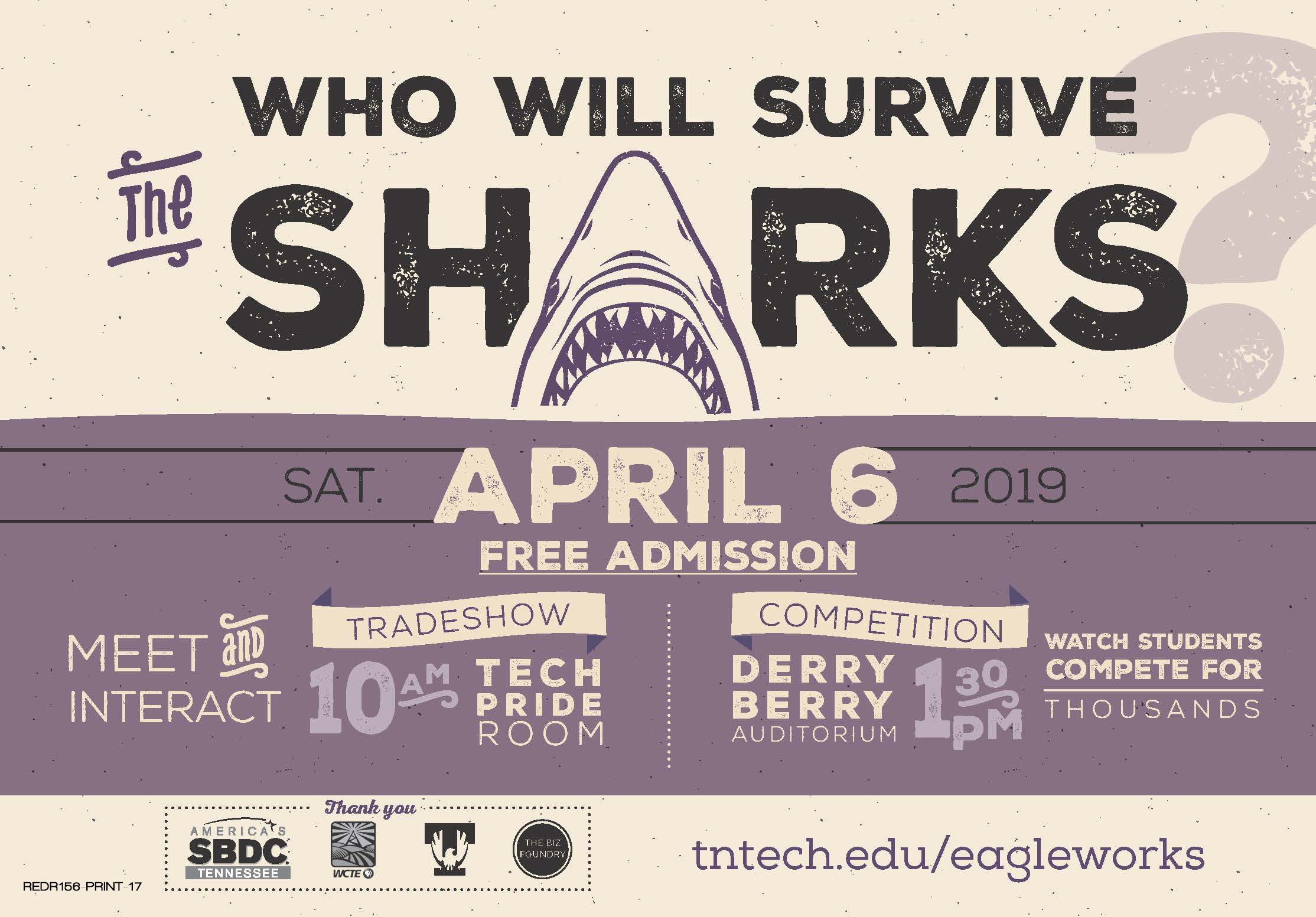
By Michelle Price
Special to the UCBJ
COOKEVILLE – Most students graduate college looking forward to starting their career working for someone else, but a select few graduate owning their own business, some even with fresh patents in their hand. For students who have participated in Tennessee Tech’s Eagle Works, the sky is the limit.
As Tennessee Tech President Phil Oldham often says, “The unofficial motto of Tech is ‘We want our students creating jobs instead of finding them.’”
Now in its sixth year, Eagle Works is a contest styled in the manner of network television’s Shark Tank series. It started in 2014 as the Innovation Entrepreneurship Competition and was primarily for engineering and business majors. It caught on and gained interest campus wide.
Last year it hit a new milestone with at least one student from each college competing and 47 majors represented.
Eagle Works is open to the community, with this year’s event held Saturday, April 6. It kicks off with a trade show held from 10 – 11:30 a.m. in the Tech Pride Room of the Roaden University Center. The main competition features the six finalist teams coming to present their companies in a Shark Tank-style pitch presentation, followed by a guest speaker and the presentation of awards. This will be held from 1:30 – 3:30 p.m. in the Derryberry Hall Auditorium.
It’s not just a pitch competition or a business plan competition. It is an interdisciplinary competition based on innovation and entrepreneurship across the entire campus.
“We want them thinking creatively and working on interdisciplinary teams,” said Michael Aikens, Tech’s director of Innovation and Entrepreneurship, who heads up the competition. “A team of 15 educators works on Eagle Works from various departments. They often encourage students to work with professors on weak points.”
Many of the ideas come from problems that students have encountered in their preferred major.
“There are a lot of nurses who come up with medical devices,” said Aikens. “There is a class – Nursing Clinical Immersions – that is 50 percent engineers and 50 percent nurses who work collaboratively to identify real unmet medical needs. Then they prototype those and go through all the innovation and entrepreneurship activities that they go through for Eagle Works, and then they come out with a product that could potentially be marketed or patented.
According to Aikens, combining differing mindsets toward a common goal often yields outstanding results.
“So, the whole idea was what happens if you put a chemical engineer together with a nurse?” proposed Aikens. “Well, the nurse looks at the human body and sees it from a medical perspective. A chemical engineer tends to look at it as a system of tubes, hoses, pipes and pressure regulation, just getting chemicals from one place to another. So, they think of the body in completely different terms and when you put them together, then all of a sudden, you’ve created some magic there, because in the real world to create a device an engineer is not going to just go to create a device. They are going to want to figure out what is the problem out there working with your medical side.
“That’s what we do at Tennessee Tech to get interdisciplinary involvement because unfortunately across higher education we tend to be in silos. So engineers do engineer things, nurses do nursing things, business majors do business things, but once you start getting them to talk together and break down those social barriers, you can really create an outstanding product and that’s exactly what we teach our students throughout the Eagle Works process.”
In October, right after fall break, advertising and promotion for Eagle Works begins. An organizational meeting is held to give all the students an overview of the process. Pop-up classes are held throughout the fall focusing on different areas such as business models, financials, intellectual property, funding, etc. They work closely with the students from the introductory meeting up to the day of the Eagle Works competition.
Typically, there are many teams that are interested, but by competition time, the field is usually down to around 20 teams.
“It’s work,” said Aikens. “You can’t just write an essay and just say ‘okay, I’m going to do Eagle Works.’ You have to do a business model. You have to do a business plan. You have to validate the idea. You have to come up with a pitch and a presentation. We also have them do a trade show.
“We allow them to experience what an actual entrepreneur would experience. And the great thing about doing it through Tennessee Tech is we provide them with a safe place to fail; because most entrepreneurs and businesses fail, and you learn so much more from failure than you ever do from success.”
Failure is a strange concept to many of the students.
“When you start talking about failure to a group of high-achieving college students, they start looking at you like a deer in the headlights, like that’s not what I want to do, but we teach them that failure is not a bad word and not a bad thing,” added Aikens.
Something that Aikens is trying to emphasize to students is that there are many parts of a team from product development to marketing and sales.
“You can be an entrepreneur and never start your own business,” said Aikens. “We have a lot of students that don’t have an idea for Eagle Works, but they have a specific skill or background that they could help a team.”
Tennessee Tech is supporting these teams and their young businesses every step along the path to success.
“With Eagle Works, we have a maker space where they can go have all their team meetings without paying for overhead,” shared Aikens. “We do a lot of pop-ups. We support them every step of the way.
“We have great partners in the Biz Foundry and the Small Business Development Center. We have a three-hour credit course taught by the College of Business that is open to any student. If they will take the resources and opportunities, then Tech provides that for them.”
The day of the competition is run with military-style precision. Competitors are given a schedule with every step of each activity timed down to the minute. This is essential to make this elaborate process seem smooth and effortless.
A trade show will be set up in the Tech Pride Room of the Roaden University Center. The public will have an opportunity from 10:00 – 11:30 a.m. to visit each team’s display and to ask any questions.

Beginning at 1:30 p.m. the top six teams will have an opportunity to give their best pitch. Each team has 12 minutes to showcase their product to a panel of significantly accomplished people. This year there is a diverse group judging including: a senior executive from FedEx, an established regional business owner, a serial entrepreneur, a finance specialist and a specialist in scientific technology.
This year’s speaker is A.J. Balou. Balou has a chemical engineering undergraduate degree from Tech. He has a master’s in electrical and computer engineering and a law degree. He will speak while the judges are making their final decisions.
Eagle Works does not invest in the competing companies, they are only offering awards to the winners. This year a total of $17,000 will be split between the top three teams. That amount varies annually depending on the earmarked donations received for the program.
Tennessee Tech, unlike some other institutions, does not retain any ownership rights (equity) to products developed by students during Eagle Works.
“That goes back into providing a safe place to fail and also succeed,” said Aikens. “We built the maker space specifically so that students can come and use the 3D printers, hardware and have a place to make their team and not have to worry about losing their intellectual property.
“As for students, we want them innovating and creating businesses and creating jobs. We hope that when they are successful, they will remember Tennessee Tech and how generous donors gave to them to succeed so that we can continue that tradition. That’s how that works.”
For more information on Eagle Works student success stories, See UCBJ’s article Eagle Works proves to be springboard to success.
For the official Tennessee Tech press release on Eagle works, see https://www.tntech.edu/news/releases/18-19/eagle-works-preview-for-this-saturday.php








